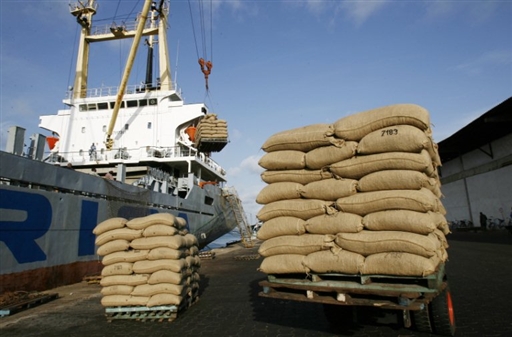Democrat May-June 2013 (Number 135)
Who would Britain trade with
asks Dave Hawkins

Is it EFTA, NAFTA, the old Commonwealth, as the eurosceptic think tanks and Tory tabloids suggest?
The impoverished three cornered debate between disaffected confused Tory grass roots, gung-ho eurosceptic factions of the City and a cautious but equally City enthralled pro-EU establishment bangs on. A series of obfuscating exchanges cloak more than they reveal as a consequence of a 40 year abnegation of responsibility by the labour movement.
Meanwhile open conflicts among the EU's power brokers following the post crash banking and Eurozone crises, including unprecedented interventions by the US President, underline the EU's significance as something far beyond a trading area. The EU is a strategic pillar of NATO and integrated global financial order. It will be permanently primed for disruption through uneven development and rivalry endemic to any temporary alliance of capitalists.
Cameron's unprecedented veto of the ESM bail-out fund following the EZs refusal in 2011 to give guarantees safeguarding the City's interests released the open conflict genie. Combined with recession and austerity, upping the ante among the contending eurosceptic factions, escalating support for UKIP and consternation among EU power brokers as to where this might end.
Enter David Owen's grandiose plan to `Restructure Europe` around EFTA and the European Economic Area (EEA) worked up from proposals circulated among the Bruges Group, Open Europe, Institute of Directors and Boris Johnson right wing eurosceptic group and dubbed `EEA Plus`.
The EEA was set up in 1994 as a deal between EFTA states of Iceland, Liechtenstein and Norway and the EU. The EEA created a single market for the free movement of capital, labour, goods and services. This excluded CAP, Fisheries Policies, Customs Union, Foreign Policy, Security, Justice and Home Affairs and euro. EEA membership was automatically conferred on all EU members.
Owen articulates the nightmare which haunts the eurosceptic right and establishment. If the eurozone becomes an economic and political bloc developing its current nascent banking union into a full blown financial services union, it would deny the City access to the single market. The EEA would develop its own foreign and defence policies and end Britain's foreign policy veto and the EU's current domination by NATO in favour of its own defence force and military-industrial-complex.
Owen's proposition is that Britain demand as a quid pro quo for acquiescing to any new EZ treaties for deeper fiscal union, guarantees covering the above together with amendments restructuring the Single Market allowing EZ to nullify current EEA opt outs. `EEA plus` would include all EU and current EEA states plus Turkey but would end the destabilising free movement of labour until such time as poorer states reached high enough levels of prosperity for their citizens to stay at home.
Negotiations would culminate in a three choice referendum offering :
1. Stay in the EU/EEA retaining the option of entering the eurozone at a future stage.
2. Stay in the EU/EEA but opt out of the euro, CAP, CFP etc
3. Withdraw completely from the EU within two years.
Owen recommends second option. But is this serious or an Owen ego trip? It is probably a negotiating ploy for the very real game of brinksmanship! What 'EEA plus' does not offer is any solution to Britain's spiral of financialisation, debt and industrial decline. Mendacious spin notwithstanding, manufacture and trade are vital to Britain's future.
But if Britain's 50yr downward trajectory proves anything it has to be that renewal is absolutely not to be found in the EU, EZ, EEA, EFTA, NAFTA, NATO or the City!
It surely lies in long term planned investment. This is possible today only as part of a wider programme of democratisation of political and economic power and redistribution of wealth that could rally the peoples of Britain behind it. But, where is the labour movement?
While asking if the propaganda power deployed in the 1975 referendum and for two generations, as Europhile exhibit 'A`, could be another trick in the inevitable forthcoming referendum?
The wave of post crash crises, not to mention the insult to the public's credulity, as in where did the: firms, six million manufacturing jobs and regular wages go?
Since the banking and finance sector's 1979 coup, any measure of concern for trade - investment in productive kit, R&D and training, protection of strategic sectors from foreign takeovers and dumping has been abandoned.
The Agreement on the EEA into force in January 1994, brings together 27 EU Member States and the three EEA, EFTA States — Iceland, Liechtenstein and Norway — in a single market or "Internal Market". The EEA Agreement that states when a country becomes a member of the European Union, it shall also apply to become party to the EEA Agreement thus leading to an enlargement of the EEA.
In reality Washington, Berlin and London have been as one in their analysis that to guarantee the eurozone's survival there has to be much greater economic and political integration amongst its member states.
There is an inherent danger, however, for those countries not in the eurozone, such as Britain, that member states could vote and act as a bloc in the single market, permanently overriding non-eurozone countries on a qualified majority vote (QMV). This was first demanded in a banking union. It could develop with fiscal union; perhaps even in a eurozone financial services union. And it could also lead to block voting on foreign, security and defence policies.
These are not remote possibilities but risks that would face any government in 2015, Labour or Conservative.
What do you think?